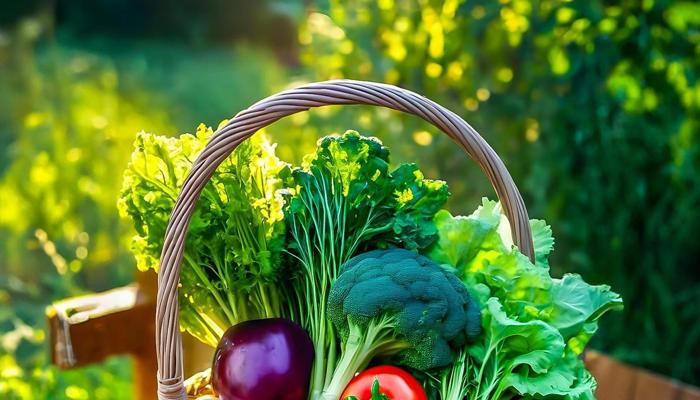Discover the joy of growing your own organic vegetables! 🥕🌿 Learn why it's rewarding, healthy, and eco-friendly. Read on!
Namaste, readers! Inflation giving you the jitters? Tired of veggies that taste
like they've been sitting on a shelf for weeks? Want to do something good for your health and the planet? Then listen up! It's time to get your hands dirty and start growing your own organic vegetables.
You don't need a sprawling farm, just a little bit of space and a dash of enthusiasm. Trust me, the rewards are well worth the effort. Let's explore why you should jump on the organic gardening bandwagon today!
Taste the Real Difference: Flavor Explosion Guaranteed!
Forget those bland, watery tomatoes you find at the market. Homegrown organic vegetables are bursting with flavor! When you grow your own, you harvest them at their peak ripeness.
Think about it: a tomato vine-ripened under the warm sun, plump with juicy goodness, picked just moments before you slice it into your salad. The difference is night and day. This also eliminates the use of chemical fertilizers and pesticides. Plants will grow with natural resources.
Organic gardening is all about feeding the soil, not the plants. Healthy soil means healthy, flavorful vegetables. When you nurture the soil with compost, manure, and other organic matter, you're creating a thriving ecosystem that supports strong, resilient plants.
These plants, in turn, produce vegetables that are packed with vitamins, minerals, and, most importantly, flavor. Imagine the taste of fresh basil, mint, or coriander and make a paste to dip any vegetable you plan to eat. Or just make a sauce out of it and include it in your roti or paratha.
Besides that, once you start using the fruits or vegetables, you will know the difference. So you get what you sow, it holds so true.
Save Money and Slash Your Grocery Bills
The price of vegetables seems to be climbing higher every day. But what if you could significantly reduce your grocery expenses? Growing your own organic vegetables is a fantastic way to do just that.
While there is an initial investment in seeds, soil, and tools, the long-term savings are substantial. You’ll notice the reduction in regular bill amount and can utilize the surplus to travel more around the world.
The idea is to not buy a lot of resources but make the best use of available resources nearby you.
Think about how much you spend on tomatoes, spinach, chilies, and other staples each week. Now imagine growing those items yourself.
A single tomato plant can produce kilograms of tomatoes over the course of a season. A small patch of spinach can provide you with fresh greens for months. Plus, you can save seeds from your harvest to plant again next year, further reducing your costs.
With a little planning and effort, you can easily grow enough vegetables to supplement your diet and save a considerable amount of money.
Having a small garden in your backyard also gives a chance to your children or family to come together and have a fun activity.
Just make sure you dont apply pesticides.
Know Exactly What You're Eating: Say No to Hidden Chemicals
One of the biggest advantages of growing your own organic vegetables is that you have complete control over what goes into them. You know exactly what fertilizers, pesticides, and other chemicals are used (or, more accurately, not used) on your plants.
This is especially important in a world where concerns about food safety are growing. When you buy vegetables from the store, you're often relying on the assurances of others about how they were grown. With homegrown organic vegetables, you have firsthand knowledge.
Organic gardening is a commitment to growing food without synthetic chemicals. This means no harmful pesticides, herbicides, or fertilizers that can contaminate your vegetables. Instead, you rely on natural methods of pest control, such as companion planting and beneficial insects.
You nourish the soil with organic matter, which provides the nutrients your plants need to thrive. By growing your own organic vegetables, you can rest assured that you're eating food that is safe, healthy, and free from harmful chemicals.
Try using cow dug instead of fertilizers.
If you have a cow, you can make use of the resource without having to spend any money. This also is a very healthy manure which improves the quality of soil.
Boost Your Health and Well-being: Sunshine and Fresh Air Included!
Gardening is more than just a way to grow food; it's also a fantastic form of exercise and a great way to relieve stress. Spending time outdoors in the sunshine, digging in the dirt, and nurturing your plants is incredibly therapeutic. It is a perfect activity to just relax after long hours of work.
Plus, getting fresh air and sunshine is essential for overall health and well-being.
The simple act of gardening can lower your blood pressure, reduce your risk of heart disease, and improve your mood.
It's also a great way to get some vitamin D, which is essential for strong bones and a healthy immune system. And let's not forget the satisfaction of harvesting your own vegetables and enjoying the fruits (or vegetables!) of your labor.
Think about the freshness of the food and how healthy one can become by eating these. It's a win-win situation for your physical and mental health.
It is a very good exercise for people who sit at home.
Especially for older men and women, this helps them to engage physically and also get required vitamin D.
Reduce Your Environmental Impact: Go Green, One Vegetable at a Time!
Commercial agriculture often has a significant environmental impact, from the use of pesticides and fertilizers to the transportation of food over long distances. By growing your own organic vegetables, you can help reduce your carbon footprint and contribute to a more sustainable food system.
There is no chemicals getting sprayed in water bodies and no transportation pollution.
When you grow your own food, you're reducing the demand for industrially produced vegetables, which often rely on unsustainable farming practices.
You're also cutting down on the transportation of food, which can consume a lot of energy and contribute to greenhouse gas emissions. Plus, organic gardening practices, such as composting and using natural fertilizers, help to improve soil health and reduce pollution.
It is to be noted that it is very helpful to reduce the pollution in environment.
Besides that, you also will get the satisfaction of doing what you can towards Mother Earth. Every time you see your plants growing, you will be proud of yourself.
Connect with Nature: Discover the Joy of Growing
In today's fast-paced world, it's easy to lose touch with nature. Gardening is a wonderful way to reconnect with the natural world and appreciate the beauty and wonder of life. Watching a seed sprout, nurturing a plant as it grows, and harvesting your own vegetables is a deeply rewarding experience.
Connecting to nature is important as we take many things for granted without realising how it helps in our survival.
It's also a great way to learn about the cycles of nature and the importance of biodiversity.
You'll gain a new appreciation for the food you eat and the effort that goes into producing it. And who knows, you might even discover a hidden talent for gardening! There is a certain satisfaction in pulling a vegetable from the ground for yourself and eating it freshly.
People have lost their love for the nature but growing vegetable and fruits will for sure help you build love towards nature.
This is a creative skill and also is an experience to feel as though we are nature. A part of us that is connected to nature and everything we can relate to.














